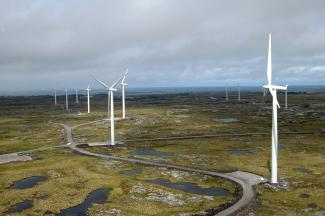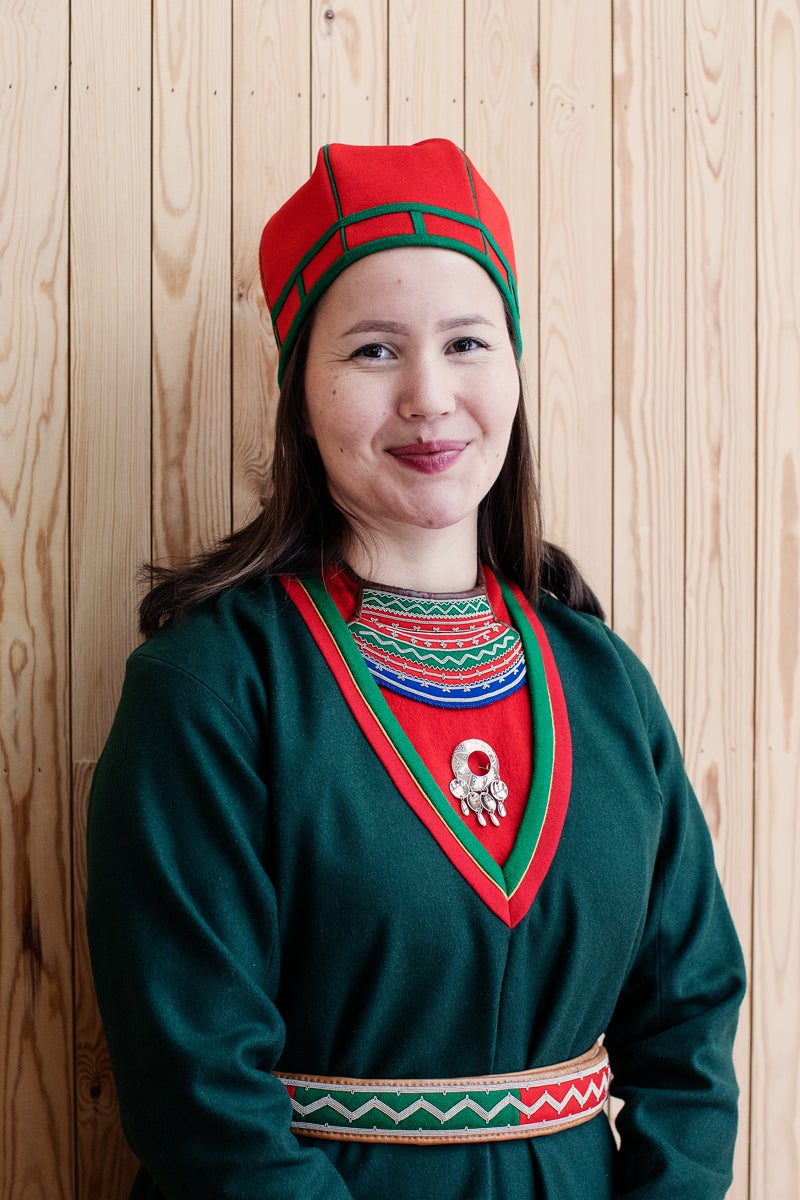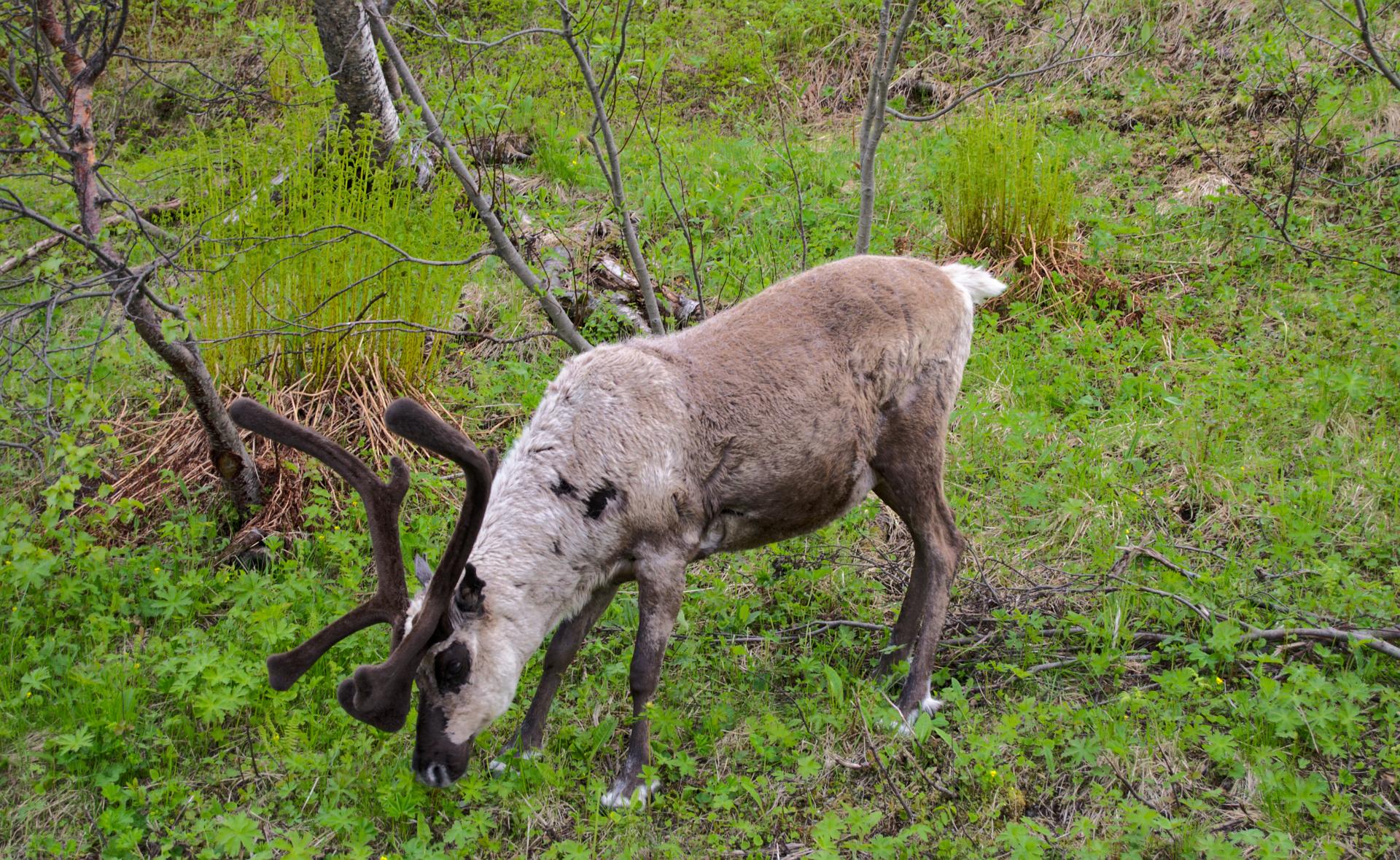
Maja Kristine Jåma (Sami) es miembro del Parlamento Sami de Noruega. Creció en una familia de pastores de renos, y la cría de renos siempre ha formado parte de su vida. Como antigua profesora de lengua sami, la defensa de los derechos lingüísticos, culturales y de pastoreo de renos es una parte importante de su trabajo y su activismo. Lo que sigue es un extracto de una entrevista con Jåma realizada en la COP 16 del Convenio sobre la Diversidad Biológica en Cali, Colombia.
Como comunidad de pastores de renos de Fosen, llevamos más de 20 años trabajando en el sistema judicial para detener la construcción y el desarrollo de proyectos de energía eólica en nuestras tierras. Hace tres años, una decisión del Tribunal Supremo declaró que se estaban violando nuestros derechos humanos, civiles y políticos a practicar nuestra cultura como pastores de renos. He intentado hablar en nombre de las generaciones jóvenes y futuras de Fosen, porque tememos no poder seguir practicando nuestra cultura como pastores de renos. La preocupación por esta pérdida encendió algo en mí y es una de las razones por las que empecé a comprometerme con las organizaciones sami en la Asociación Sami de Noruega (la mayor organización sami) y a formar parte del Parlamento Sami de Noruega. Fui elegido representante parlamentario de la zona sami meridional y más tarde conseguí un puesto como miembro del consejo de gobierno del Parlamento Sami. Ahora trabajo en cuestiones políticas relacionadas con el uso de la tierra, el agua, el clima y la cultura.
En el Ártico estamos muy conectados a nuestras tierras, aguas, ríos y bosques. Nuestra vida está ahí. Vivimos con la naturaleza y en la naturaleza. Dependemos de ella para alimentarnos, para mantener nuestra cultura y nuestra lengua y para transmitir nuestros conocimientos tradicionales a las generaciones venideras. Todas estas conexiones con el pastoreo de renos y su seguimiento durante las diferentes estaciones, pero también con la recolección de bayas, plantas medicinales, la pesca y el hecho de formar parte de todo un sistema alimentario, están muy relacionadas con lo que somos, con nuestra identidad. Lo que hacemos durante el año tiene un lenguaje tan rico que describe cada pequeño detalle que sucede. Nuestro lenguaje no puede traducirse a otras actividades de la misma manera

Maja Kristine Jåma.
Para nosotros, el año empieza cuando nace una cría de reno. Eso ocurre en primavera, cuando empieza la nueva vida y todo lo demás. Estamos esperanzados y hacemos todo lo posible para que nuestros terneros tengan un buen comienzo, porque ese es nuestro futuro, nuestra cultura y también nuestros ingresos. En verano, marcamos la oreja del ternero con un cuchillo para saber quién es el propietario. Yo tengo mi propia (marca) y mi propio reno. En sámi, mi marca es “garrah namhpe tjiehkie åvtelde, åelkies tjiehkie åvtelde”. No se puede traducir a otro idioma. También hay nombres específicos que denotan la edad del reno, si es hembra o macho, su aspecto y sus diferentes colores en el pelaje y la cornamenta.
Vemos que los cambios (debidos al cambio climático) se producen muy deprisa. En los últimos años, los inviernos han sido más suaves y el tiempo es más impredecible. Esto afecta a nuestros conocimientos y prácticas de pastoreo, ya que conocemos las diferentes estaciones. Los renos quieren ir a ciertos lugares donde el pasto es bueno. Las temperaturas son cada vez más cálidas, y vemos llover en pleno invierno. Esto causa problemas importantes porque los pastos se congelan, y los renos no tienen suficiente acceso a la tierra y pueden llegar a morirse de hambre, por lo que hemos tenido que alimentarlos nosotros mismos. Eso dificulta enseñar a los renos a alimentarse por sí mismos. Hemos tenido esta crisis de pastoreo en los últimos inviernos, y seguiremos viendo que ocurre con más frecuencia.
Otro motivo de preocupación es la llegada de otras especies a nuestras aguas, que compiten con algunas de las especies autóctonas. Con los mares en alerta, la pesca y la agricultura en nuestras zonas tradicionales se han convertido en empresas más atractivas, amenazando a las pequeñas pesquerías. Esto ha creado un problema con el salmón atlántico, que está desapareciendo y provocando una pérdida de cultura. Cuando no hay peces, se pierden tanto los medios de subsistencia como la cultura, y también se pierden los conocimientos tradicionales y la lengua.
Se están realizando esfuerzos para revitalizar nuestra lengua y la situación es más brillante que antes, pero aún nos enfrentamos a muchos retos. Las políticas de asimilación de los gobiernos de todos los Sápmi (Noruega, Suecia, Finlandia y Rusia) han tenido graves consecuencias. No se nos permitía hablar sami en la escuela; no se nos permitía tener nombres sami, y no se nos permitía comprar tierras en nuestra tierra. Este proceso de asimilación comenzó hace cientos de años. En Noruega está documentado el peor periodo de asimilación desde el siglo XVIII hasta hoy. En Noruega se creó un Comité de la Verdad y la Reconciliación que elaboró un informe sobre las consecuencias de la asimilación. El Comité ha recogido muchas historias del pueblo sami y ha intentado proponer algunas medidas sobre lo que los Estados pueden hacer para reparar los daños de las políticas de asimilación forzosa y cómo restaurar nuestra cultura, lengua y medios de vida. Aún queda mucho camino por recorrer. Tenemos que reconocer que estas estructuras asimilacionistas siguen aquí, y tenemos que cambiarlas.

Reindeer are central to Sámi language and culture. Photo by Denis Simonet.
En lo que respecta a los derechos sami a la tierra y el agua, hay muchos proyectos y desarrollos “verdes” en Sapmi, como proyectos de energía eólica e hidroeléctrica. Las presas y otras fuentes de energía denominadas “verdes” se presentan como una solución al cambio climático. Estos proyectos se están construyendo en tierras Sápmi sin el consentimiento de nuestro pueblo, en violación de nuestros derechos. Se trata de una forma de colonización verde; por ejemplo, hay que poner fin a la práctica de dar permiso a las empresas para construir cuando el caso contra un proyecto todavía se está litigando en el sistema judicial. Si un caso está en los tribunales, el proyecto debería detenerse a la espera de la decisión del tribunal. Pero se permite que estos proyectos se inicien o continúen si ya están en proceso. Esto es lo que ocurrió en Fosen. El parque eólico nunca debió construirse, como afirmó el Tribunal Supremo.
Por desgracia, no hay ejemplos positivos de cómo se han respetado nuestros derechos en ningún proyecto. Pero debemos estar de acuerdo en que no podemos tener un sistema que contribuya realmente a la violación de los derechos humanos. Eso es lo más básico. El hecho de que tengamos que hablar y asegurarnos de que nuestros gobiernos respetan nuestros derechos a la autodeterminación y al Consentimiento Libre, Previo e Informado (CLPI) es indicativo de la situación actual con respecto a nuestros derechos. El Estado debería reforzar las estructuras basicas o cualquier proyecto de desarrollo propuesto en nuestras tierras para garantizar que se respetan nuestros derechos.
Top photo: Reindeer herding practices are strongly affected by large scale wind farms as reindeer avoid areas where turbines stand.
Photo by Statkraft.
